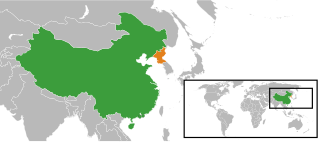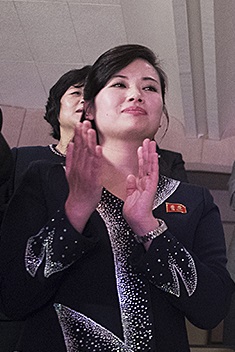Related Research Articles
An estimated 84,532 South Koreans were taken to North Korea during the Korean War. In addition, South Korean statistics claim that, since the Korean Armistice Agreement in 1953, about 3,800 people have been abducted by North Korea, 489 of whom were still being held in 2006.
People defect from North Korea for political, material, and personal reasons. Defectors flee to various countries, mainly South Korea. In South Korea, they are referred to by several terms, including "northern refugees" and "new settlers".

Choe Yong-gon was the Supreme Commander of the Korean People's Army from 1948 to 1950, North Korean defence minister from 1948 to 1957, and the Chairman of the Standing Committee of the Supreme People's Assembly of the Democratic People's Republic of Korea from 1957 to 1972.

Hwang Jang-yop was a North Korean politician who served as the Chairman of the Supreme People's Assembly from 1972 to 1983 and was largely responsible for crafting Juche, the state ideology of North Korea. He defected to South Korea in 1997, the highest-ranking North Korean to have defected.

Kim Jong Un is a North Korean politician who has been supreme leader of North Korea since 2011 and the leader of the Workers' Party of Korea (WPK) since 2012. He is the third son of Kim Jong Il, who was the second supreme leader of North Korea, and a grandson of Kim Il Sung, the founder and first supreme leader of the country.

The bilateral relations between the People's Republic of China (PRC) and the Democratic People's Republic of Korea (DPRK) have been generally friendly, although they have been somewhat strained in recent years because of North Korea's nuclear program. They have a close special relationship and China is often considered to be North Korea's closest ally. China and North Korea have a mutual aid and co-operation treaty, signed in 1961, which is currently the only defense treaty either country has with any nation.

Kim Il Sung was a North Korean politician and the founder of North Korea, which he led as Supreme Leader from the country's establishment in 1948 until his death in 1994. Afterwards, he was declared eternal president.
Capital punishment is a legal penalty in North Korea. It is used for many offences, such as grand theft, murder, rape, drug smuggling, treason, espionage, political dissent, defection, piracy, consumption of media not approved by the government and proselytizing religious beliefs that contradict practiced Juche ideology. Owing to the secrecy of the North Korean government, working knowledge of the topic depends heavily on anonymous sources, accounts of defectors and reports by Radio Free Asia, a United States government-funded news service that operates in East Asia. The country allegedly carries out public executions, which, if true, makes North Korea one of the last four countries to still perform public executions, the other three being Iran, Saudi Arabia, and Somalia, but this has been disputed by some defector accounts.

Ryu Mi-yong was the chairwoman of the North Korean Chondoist Chongu Party. She was a standing committee member of the 10th Supreme People's Assembly. She was known as a defector from South Korea to the North.

Pyongyang (Korean: 평양관) is a restaurant chain named after the capital of North Korea, with around 130 locations worldwide. The restaurants are owned and operated by the Haedanghwa Group, an organization of the government of North Korea.
Kim Kyong-hui is the aunt of current North Korean leader, Kim Jong Un. She is the daughter of the founding North Korean leader Kim Il Sung and the sister of the late leader Kim Jong Il. She currently serves as Secretary for Organization of the Workers' Party of Korea. An important member of Kim Jong Il's inner circle of trusted friends and advisors, she was director of the WPK Light Industry Department from 1988 to 2012. She was married to Jang Song-thaek, who was executed in December 2013 in Pyongyang, after being charged with treason and corruption.

The death of Kim Jong Il was reported by North Korean state television news on 19 December 2011. The presenter Ri Chun-hee announced that he had died on 17 December at 8:30 am of a massive heart attack while travelling by train to an area outside Pyongyang. Reportedly, he had received medical treatment for cardiac and cerebrovascular diseases, and during the trip, Kim was said to have had an "advanced acute myocardial infarction, complicated with a serious heart shock". However, it was reported in December 2012 by South Korean media that the heart attack had instead occurred in a fit of rage over construction faults in a crucial power plant project at Huichon in Chagang Province.

Hyon Song-wol is a North Korean singer, band leader, and politician. She is the leader of the Moranbong Band and of the Samjiyon Orchestra. She was formerly a featured vocalist for the Pochonbo Electronic Ensemble in the early 2000s, a pop group which found fame in North Korea in the late 1980s and 1990s. She has been a member in the Central Committee of the Workers' Party of Korea since 2017.

The Moranbong Band, also known as the Moran Hill Orchestra, is a North Korean girl group. The original members were selected by the country's supreme leader, Kim Jong Un. Performing interpretive styles of pop, rock, and fusion, they are the first all-female band from the DPRK, and made their world debut on 6 July 2012. Their varied musical style has been described as symphonic because it is "putting together different kinds of sounds, and ending in a harmonious, pleasing result."
NK News is an American subscription-based news website that provides stories and analysis about North Korea. Established in 2011, it is headquartered in Seoul, South Korea with reporters in Washington, D.C., and London. Reporting is based on information collected from in-country sources, recently returned western visitors to North Korea, stories filed by the Korean Central News Agency (KCNA), interviews with defectors, and reports published by NGOs and western governments. The site's founder and Managing Director is Chad O'Carroll, a former employee of the German Marshall Fund, who has written on North Korea and North Korea issues for The Daily Telegraph.
Media coverage of North Korea is hampered by an extreme lack of reliable information, coupled with an abundant number of sensationalist falsehoods. There are a number of reasons for this lack of information and incorrect stories.

After the Korean War, 333 South Korean people detained in North Korea as prisoners of war chose to stay in North Korea. During subsequent decades of the Cold War, some people of South Korean origin defected to North Korea as well. They include Roy Chung, a former U.S. Army soldier who defected to North Korea through East Germany in 1979. Aside from defection, North Korea has been accused of abduction in the disappearances of some South Koreans.
The Reconnaissance General Bureau is a North Korean intelligence agency that manages the state's clandestine operations. Most of their operations have a specific focus on Japan, South Korea, and the United States. It was established in 2009.

Hwang Sun-hui was a North Korean politician who served in several high-ranking positions in the Workers' Party of Korea (WPK), including in the Supreme People's Assembly and the Central Committee of the WPK. She was affiliated with the Korean Revolution Museum from 1965, and was its director from 1990.

The COVID-19 pandemic in North Korea was part of an global pandemic of coronavirus disease 2019 (COVID-19), a novel infectious disease caused by severe acute respiratory syndrome coronavirus 2 (SARS-CoV-2). North Korea confirmed its first case on 8 May 2022.
References
- ↑ Korea Times
- 1 2 3 4 "Ryu Mi-yong – Representitive [sic] of Chongdogyo in North Korean". 16 August 2000. Archived from the original on 26 October 2012. Retrieved 10 October 2012.
- ↑ The Daily Telegraph
- 1 2 Shim, Elizabeth (July 7, 2019). "South Korean man defects to North Korea, Pyongyang says". UPI. Archived from the original on July 7, 2019.
- 1 2 3 Ju-min Park (18 August 2013). "North Korea Is Promising No Harm And Cash Rewards For Defectors Who Come Back". Business Insider. Additional reporting by Se Young Lee in Seoul and Stephanie Nebehay in Geneva; Editing by Dean Yates and David Chance. Reuters. Archived from the original on 24 September 2015. Retrieved 12 May 2015.
- 1 2 Chung Min-uck (24 December 2013). "More N. Korean defectors going back". The Korea Times . Archived from the original on 28 September 2015. Retrieved 12 May 2015.
- 1 2 3 4 McCurry, Justin (22 April 2014). "The defector who wants to go back to North Korea". The Guardian. Archived from the original on 27 March 2015. Retrieved 12 May 2015.
- ↑ "Almost 700 N. Korean defectors' whereabouts unknown". Yonhap News Agency . 27 September 2015. Archived from the original on 28 September 2015. Retrieved 27 September 2015.
- ↑ Adam Taylor (26 December 2013). "Why North Korean Defectors Keep Returning Home". Business Insider. Archived from the original on 24 September 2015. Retrieved 12 May 2015.
- 1 2 Ahn, JH (17 July 2017). "Former TV star defector back in North Korea: state media". NK News . Archived from the original on 17 July 2017.
- ↑ "N. Korea's 're-defector' to stand to trial in Seoul". Global Post. Yonhap News Agency. 11 September 2013. Archived from the original on 24 September 2015. Retrieved 12 May 2015.
- ↑ Joo, Seong-ha (28 June 2016). "Denying human rights to uphold it: A N.Korean defector's case". NK News . Archived from the original on 29 June 2016.
- ↑ Ji, Dagyum (28 July 2017). "N. Korean re-defector arrested in S. Korea for violating national security law". NK News . Archived from the original on 28 July 2017.
- ↑ "South Korea deports North Korean arrivals for first time since the Korean War – fishermen who murdered their 16 crewmates". ABC. 8 November 2019.
- 1 2 "Coronavirus: Swimming defector was not infected, says S Korea". BBC. July 27, 2020. Retrieved July 27, 2020.
- ↑ Kim, Yong Mok (November 1997). "The Dilemma of North Korea's Japanese Wives". Japan Policy Research Institute Critique. 4 (10). Archived from the original on 2006-09-27. Retrieved 2007-03-16.
- ↑ Lankov, Andrei (2007-11-18), "Chinese Community in NK", Korea Times, retrieved 2009-10-15